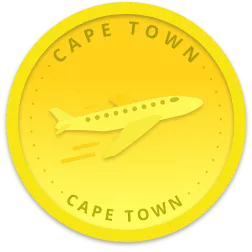Located on the shore of Table Bay, the city is close to the southern tip of Africa.
Photo by Dave Morton
Table Mountain is one of the oldest things you'll ever see with your own eyes. The rocks that make up this flat-topped giant are 500 million years old. That's older than the dinosaurs, older than the Himalayas, older than almost anything on Earth.
When a Portuguese explorer climbed it in 1503, he thought it looked like a table and named it exactly that.
The Dutch showed up in 1652 to grow vegetables for ships sailing to Asia. They set up camp right beneath the mountain and started farming.
The Khoikhoi people had been living here for thousands of years, but the Dutch pushed them off their land and brought in slaves from places like Indonesia and Malaysia.
Those slaves left a big mark on Cape Town. In Bo-Kaap, the city's oldest neighborhood, you'll see houses painted bright pink, orange, blue, and yellow.
When slavery ended in 1834, the story goes that families painted their homes in wild colors to celebrate their freedom. Before that, every house had to be white.
Cape Town also has some painful history. During apartheid, the government forced black and mixed-race South Africans to live separately from white people.
Starting in 1966, they forced 60,000 people out of a neighborhood called District Six and bulldozed their homes. Only the churches and mosques were left standing.
On Robben Island, which you can see from the harbor, Nelson Mandela spent 18 years locked in a tiny cell. He later became South Africa's first Black president. Today, people who were once prisoners on that island give the tours.
Ride the cable car up Table Mountain for views that go on forever. Walk through Bo-Kaap's rainbow streets and try bobotie, a sweet and spicy meat dish baked with an egg topping.
Drive to Boulders Beach to watch 2,000 African penguins waddle across the sand. You can even swim near them. At the District Six Museum, former residents have written on a giant floor map showing exactly where their houses used to be.


XP EARNED OUT OF 0
Points Breakdown
| Sticker Collected | 0 XP |
| Card Collected | 0 XP |
| Bonuses | 0 XP |
| Total | 0 XP |
Local Airport
Cape Town International Airport

Elevation
46 m
Opened
1954
Runways
2


